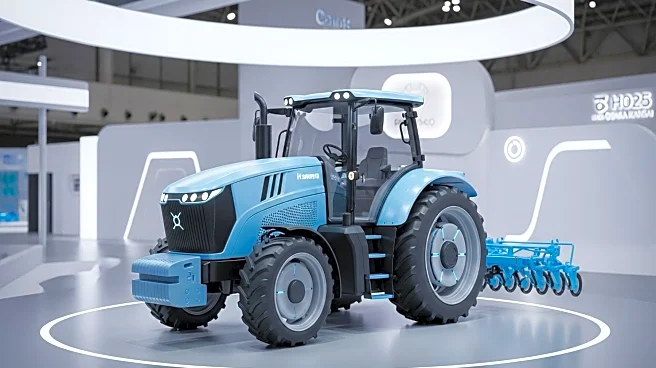What is the story about?
What's Happening?
Kubota has introduced a concept model of an autonomous hydrogen fuel cell tractor at the Expo 2025 Osaka Kansai, marking the first public display of such a machine. The tractor, showcased at the 'Hydrogen Energy Park' event, integrates decarbonization and automation trends in agriculture. It operates using compressed hydrogen through a solid polymer fuel cell system, emitting only water as a by-product. Designed to match the output of a 100-horsepower diesel model, the tractor eliminates emissions and features autonomous driving and remote operation capabilities, allowing for operator-free field work. Kubota's initiative addresses climate change and labor shortages in agriculture, with plans for demonstration tests in Japan, including autonomous driving trials and studies on hydrogen supply methods for agriculture.
Why It's Important?
The unveiling of Kubota's hydrogen fuel cell tractor represents a significant advancement in sustainable agricultural technology. By eliminating emissions and reducing reliance on fossil fuels, this innovation supports global efforts to combat climate change. The tractor's autonomous capabilities also address labor shortages in agriculture, potentially increasing efficiency and productivity. Kubota's focus on decarbonization technologies, including hydrogen fuel cells, positions the company as a leader in developing environmentally friendly solutions for large agricultural machinery. This development could influence industry standards and encourage other manufacturers to invest in similar technologies, promoting a shift towards sustainable farming practices.
What's Next?
Kubota plans to conduct demonstration tests in Japan to further explore the tractor's autonomous driving capabilities and hydrogen supply methods suitable for agriculture. These trials will provide valuable insights into the practical application of hydrogen fuel cell technology in farming conditions. As Japan accelerates its hydrogen economy, the success of these tests could lead to broader adoption of hydrogen-powered agricultural machinery. Stakeholders, including government agencies and industry leaders, may respond by increasing investments in hydrogen infrastructure and technology development, potentially influencing global agricultural practices and policies.
Beyond the Headlines
Kubota's initiative highlights the ethical and environmental dimensions of transitioning to sustainable agricultural practices. The use of hydrogen fuel cells in large machinery not only reduces carbon emissions but also sets a precedent for responsible innovation in the industry. This development may prompt discussions on the long-term impacts of automation in agriculture, including potential shifts in labor dynamics and the need for new skill sets among workers. As the industry evolves, stakeholders must consider the balance between technological advancement and social implications, ensuring that the benefits of innovation are equitably distributed.
















